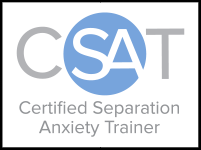Separation Anxiety Training
What is Separation Anxiety?
Separation anxiety is a genuine panic disorder or phobia, like the equivalent of fear of flying or heights in humans. And like any other type of anxiety, a dog who has this phobia doesn’t have any control over it. His destructiveness, self-injury or howling while alone are not symptoms of misdirected anger or stubbornness. He can't be consoled with extra yummy treats. (You know that, probably, or you wouldn't be reading this.) And sadly, the escape-proof crates that owners have to resort to often only make things worse.
Separation anxiety is the ugly stepchild of behavior problems. Many dog trainers won't treat it, and many rescues won't even try to place dogs who have it. Estimates are that approximately 17% of all dogs suffer from separation anxiety, and it's one of the top causes of early euthanasia for pet dogs and dogs in shelter alike. But like any other fear, effective treatment for separation anxiety is available, based on sound behavioral principles of desensitization and, at times, veterinary support.
Philosophy and Treatment
The treatment protocol is very like the approach you’d take with a child who’s afraid of water. It involves careful, gradual work in the shallow end with lots and lots of confidence-building activities. When the child’s always successful, and she's never asked to do more than she's ready for, she can gradually take more and more risks.
For a dog that's used to panicking when she's left alone, getting used to relaxing instead can take time and repetition, like all behavior change. But what starts out as almost-imperceptible progress builds quickly and exponentially into real, meaningful, blissful alone time that changes the lives of dogs and their owners.
We work with dogs all over the country thanks to today's modern technology. In fact, remote training is ideally suited to separation anxiety. All you need is a computer with a webcam, and we'll talk you through the rest.
Get in touch with us for a free phone call to discuss your dog's symptoms and our treatment approach.
The sooner you get started, the sooner everybody can breathe a sigh of relief!




